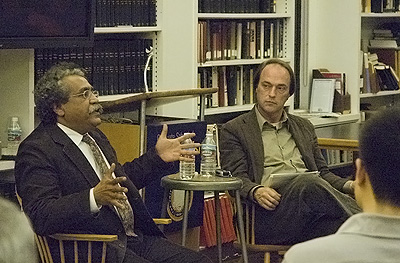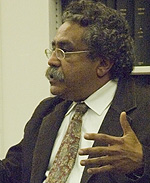UC Berkeley Web Feature
 |
Hani Shukrallah and Sandy Tolan at UC Berkeley's Graduate School of Journalism. (BAP photos) |
Egyptian journalist and visiting lecturer Hani Shukrallah tackles myth of West vs. Muslim world
BERKELEY –The idea that there is an ongoing "clash of civilizations" between the West and the Muslim world - and that recent violent protests by Muslims over offensive cartoons of the Prophet Muhammad are just another scuffle in that war - "is abhorrent and false," visiting lecturer Hani Shukrallah told an audience at the Graduate School of Journalism Wednesday night (Feb. 15).
Nor can the protests be reduced to democratic freedom of expression versus religious fundamentalism, Shukrallah argued. What's happening is much more complicated: a people whose pride has been insidiously undermined for much of the past century, governments seeking to exploit that wounded pride to strengthen their Islamic credentials, and a Europe that both needs and resents its immigrants. And yet the notion of a clash of civilizations has become widespread enough, he says, that the supposed combatants are coming to define themselves under its terms and "it is in danger of becoming a self-fulfilling prophecy."
The Danish newspaper cartoons were a "deliberate attempt to pick a fight," and while "the Muslims responded immediately and idiotically," that does not excuse their publication, in Shukrallah's opinion.
Shukrallah is the former editor in chief of Al-Ahram* Weekly, a Cairo-based, English-language newspaper famous as a haven of free expression and intellectual debate for Arab voices around the world. Yet even that haven is under pressure from an increasingly repressive Egyptian government. Not long ago, Shukrallah was "sacked for doing his job too well," said Sandy Tolan, director of UC Berkeley's Project on International Reporting, who introduced Shukrallah at Wednesday's event. "But our gain is Egypt's loss." Shukrallah now teaches a class at Berkeley called "Arab Voices: Contemporary Arab Thought and the Roots of Middle East Conflict." He also consults for the Al-Ahram Center for Political and Strategic Studies, a Middle Eastern think tank.
 'To reduce all the influences that have come together to make me or any other Arab or Muslim, to one determinant, Islam — and that Islam as an unchanging, constant, undifferentiated, monolithic entity — is repugnant.' -Hani Shukrallah |
The clash hypothesis was first put forth by Samuel Huntington in a 1993 Foreign Affairs article in the form of a question: "The Clash of Civilizations?" Huntington postulated that the post-Cold War world would be riven not by ideological or economic battles, but by cultural ones having to do with the "fault lines" between the seven or eight major civilizations he identified as "Western, Confucian, Japanese, Islamic, Hindu, Slavic-Orthodox, Latin-American and possibly African civilization."
If that lists sounds like a hodgepodge of religion, geography, and abstraction to you, you're not alone. The piece sparked an outraged reaction among many liberal American and Muslim intellectuals when it appeared.
"To reduce all the influences that have come together to make me or any other Arab or Muslim, to one determinant, Islam — and that Islam as an unchanging, constant, undifferentiated, monolithic entity — is repugnant," said Shukrallah. With amusement he pointed out the fallacy of the idea of a "West" descended from Ancient Greece, which had much closer ties culturally and geographically to Egypt than to the Europe of its time. (His rhetorical question "And what was happening in Denmark then?" was greeted with many chuckles.)
Cultures continually redefine themselves, and their histories cannot be reduced to constants. To illustrate, Shukrallah recalled that he had grown up "in an Egypt where there was no such thing as the veil. Only peasant women covered their heads, and not for religious reasons. Why is that period of history any less authentic" than the current one, he asked, in which he has been surprised to find even formerly secular middle-class Egyptian friends obeying the call to prayer in their homes? Meanwhile, the so-called Judeo-Christian tradition that defines the democratic "West" for centuries demonized Jews and was governed by theocracies.
Basically, "Huntington took a political observation and set it up as an absolute of history," criticized Shukrallah. Pointing out that the article piggybacked on the framing provided by a previous 1990 article, he says that the idea of the clash was embraced, particularly by neocons, because "the collapse of the Cold War produced the need for another demon."
But while the idea of clash may be hooey, Shukrallah warned, vast numbers of Muslims have internalized what he calls this "recycled 19th-century racist Orientalism."
There is a very real feeling of systematic persecution among many Muslim Arabs, as Shukrallah put it, and it is not limited to the poor and uneducated. "People will tell you quite seriously that 'the West is out to get us,' even as they are eating a hamburger in a McDonald's before going home to watch 'Friends' on TV," he said, chuckling.
Although the American question "Why do they hate us?" should be an unanswerable one, as there is no monolithic "they" any more than there is a one-size-fits-all "us," Shukrallah was willing to break the rules of his argument and attempt to explain the feelings of "the Arab world."
Arabs feel justly persecuted, not only because they are assaulted with words and hate-mongering newspaper cartoons, but because "it's armies, it's missiles, it's a country [Iraq] decimated," he said. While Saddam Hussein was indeed a vicious tyrant, he did not destroy Iraq in the way that America has. When Colin Powell at a State Department dinner attended by Shukrallah spoke proudly about building schools in Iraq, "it's very insulting. This was a country that had the best educational system, the best health system, in the whole Middle East," said Shukrallah. "You starve it for 10 years [with sanctions], then bomb the hell out of it, plunder its antiquities, and then act as if it had no history."
Add to this the Arabic-speaking countries' long history of oppression at the hands of European colonizers; more recent humiliations, such as the swift military defeats of Egypt in 1967 and Iraq in the 1991 Gulf War; and Europeans' reluctance and racism in response to their influx of much-needed Muslim immigrants. Any further insult ends up "creating a very fertile ground for Islamism," Shukrallah said - which in its way is a kind of frustrated, subverted Arab nationalism.
During a question-and-answer session after the extremely free-ranging, somewhat rambling discussion, which also covered Egypt's and Palestine's political futures, Shukrallah admitted that he had no solutions to offer on how to defuse the next conflict when it comes.
First, Middle Eastern countries need more ability to debate, he said, complaining that "ideology without politics is religion," defining politics as "where ideas are put to the test of reality, with real people and real problems and needs." The real promise of democracy may not be its potential to elect secular alternatives to those holding the power, formally or informally - as the recent victories by Hamas and the Muslim Brotherhood illustrate - but "to recreate political space in the Arab world" that forces ideologists to demonstrate the validity and utility of their beliefs.
"You cannot have democracy," Shukrallah reminded his mostly American audience, "when you can't have dissent."
*Correction appended: Al-Ahram Weekly was misspelled in the initial version of this story. The NewsCenter regrets the error.

